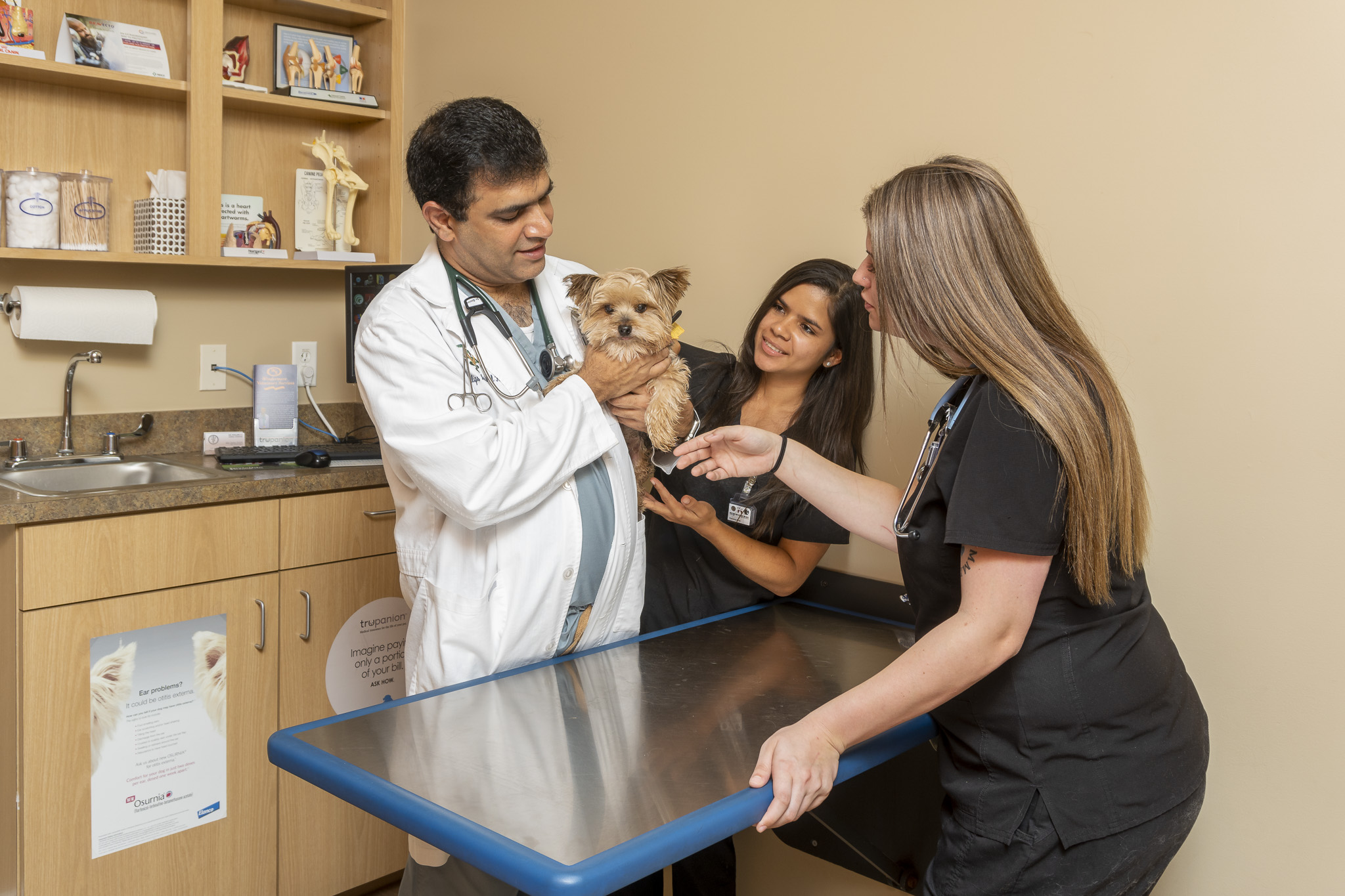
We're here for you
Emergency?
If your pet is exhibiting concerning symptoms or experiencing a medical emergency, please call our clinic at (407) 352-2579. We’ll help you through it.

Weight fluctuations are normal throughout a healthy pet’s life. As they age, their body size will change and adapt to its natural rhythm, and even sometimes change depending on the season. While some weight changes are normal, if your pet is suddenly losing a lot of weight it could be a sign of a larger health issue. Start by observing their everyday behaviors such as their eating and exercise habits. If they seem to be eating normally, consult with a vet for further testing and diagnosis.
Common Reasons Your Pet Is Losing Weight
Excessive weight loss could simply be a case of not eating enough nutrition, or it could be a symptom of an underlying illness.
Poor Diet
Many of us feed our pets whatever pre-packaged pet food we can find in the store. While not all packaged pet foods are bad, if your pet is dramatically losing weight, they may not be getting enough proper nutrition in their diet. It could be that they are not being fed enough calories based on their breed and size, or it could be that they need to eat higher-quality meals so they can turn their food into fuel.
Anorexia
There are a variety of underlying causes of anorexia in pets ranging from an underlying disease to a behavioral condition. Anorexia, or a lack of appetite, is commonly caused by emotional stress or separation anxiety. When pets feel worried or abandoned, they may intentionally starve themselves over long periods.
Intestinal Parasite
Some parasite infections can interfere with a pet’s ability to absorb nutrients, making it harder for them to put on weight. Parasites such as giardia, hookworm, and tapeworms can all lead to maldigestion and weight loss. Other symptoms of an intestinal parasite include vomiting, swelling of the abdomen, loose stools, and loss of appetite. If you suspect a parasite is present, ask your vet about anti-parasite medications.
Poor Dental Health
If your pet has an oral disease or damaged teeth, it may be too painful for them to eat consistently. Inflammation present in the enamel of the teeth or gums is typically a signal of a greater dental health issue such as periodontal disease. If you see redness and swelling in your pet’s teeth be sure to take them to a vet for an oral exam and dental cleaning.
Cancer
In rare cases, cancer could be the reason your pet is losing so much body weight. When cancer cells are present, the body has to work harder to fight against those cells, which can contribute to the loss of fat or muscle tissue. Other symptoms of cancer in pets besides weight loss are poor body odor, lethargy, wounds that take longer to heal, and difficulty eating.
What Should You Do if Your Pet Keeps Losing Weight?
If you suspect the weight loss in your pet is above average, try opting for at-home diet changes or asking a professional for advice.
Incorporate Healthy Fat & Protein in Their Diet
To help pets put on extra weight, they’ll need to be eating a diet high in protein and fat. Protein and fat are essential for building muscle and maintaining healthy body weight. Adding cooked meat, fish, or avocado can be a great way to fuel some healthy weight gain and keep your pet satisfied. You could also try adding supplements such as bovine collagen or fish oil as an added nutritional resource.
Go to a Vet for Diagnostic Testing
If you’ve already tried switching up your pet’s diet and nothing seems to be working, you’ll need to take your pet to the vet for medical testing. A vet can test for problems such as gastrointestinal parasites, dental decay, or cancer cells. Once a vet can determine what exactly is causing a pet’s weight loss, they can help you create an individualized health plan for your pet to treat the root issue.
Follow a Vet’s Treatment Protocol
If a vet provides a treatment plan to help your pet gain more weight, it’s important to follow their specific instructions. These are the most common treatment options for excess weight loss, but it’s important to always consult with a veterinarian before trying these at home.
- Anti-parasitic medication
- Chemotherapy
- Radiation
- Dental cleaning
- Pet safe antiseptic mouth rinse
- Nutritional supplements
- Feeding your pet a diet rich in protein and fat

Step One:
Call us to book your pet’s appointment.

Step Two:
Our expert vet will take care of all of your pet’s needs.

Step Three:
Get back to enjoying your happy and healthy life with your furry best friend.

Get the Best Care for Your Pet
Come Visit Dr. Qasim
Book your pet’s appointment with Dr. Qasim to ensure a long, happy life together.

We love and care for each patient as if they were our own pet.
Meet Our Team of Animal Lovers
Dr. Bilal Qasim, DVM, established Dr. Phillips Animal Hospital in 2011 after practicing veterinary medicine for over 17 years with the help of talented and caring veterinary technicians.


